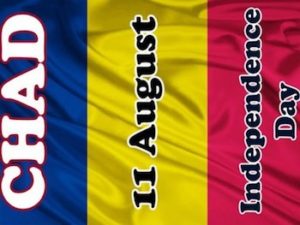
*On this date in 1960, Chad gained its independence from France. The Republic of Chad is a large landlocked country in western central Africa, formerly a part of French Equatorial Africa.
This repaired the invasion of the 1884 Berlin Conference, the high point of white European competition for territory in Africa, a process commonly known as the Scramble for Africa.
The Lake Chad region has been settled since about 500 BC. North African Berbers controlled trans-Saharan commerce from the 8th to the 11th century. Then, Arabs gained control of trade, gradually gained political control, and converted local Africans to Islam. In the 18th century, the Ottoman Empire claimed Chad. Later, when European powers split up control of Africa, France gained control of Chad. In 1910, Chad was made part of French Equatorial Africa, and in 1946, it became a French overseas territory.
Since independence, civil war and prolonged droughts have devastated much of the country, resulting in severe food shortages. Foreign governments, especially France, have helped in several ways, including preventing Libya from expanding into Chad from the north. Internal growth has slowed, and Chad has become increasingly dependent on food imports, fuel, and other products. Civil war broke out in the mid-1960s when two guerrilla groups struggled to overthrow the government and create closer ties with Arab North Africa.
In the late 1970s, Libya supported one of these groups and attempted to annex part of Chad. Foreign intervention halted Libyan expansion and contained the civil war in Chad, but conflict with Libya continued until 1988, when diplomatic relations between the two countries were restored. According to the 1989 constitution, a president, head of state, governs Chad, and a 123-member National Assembly is elected by universal suffrage.
There are no political parties, but groups aligned with the Islamic north and with the Sara tribes in the south have attempted to gain control of the government. In 1990, Gen. Idriss Deby overthrew President Hissène Habré, suspended the constitution, and dissolved the legislature. In March 1991, Deby established a new government according to the terms of a national charter adopted on February 28. Chad’s population, as of a 1991 estimate, was 5,823,000.
In the 21st century, Chad is one of the leading partners in a West African coalition fighting Boko Haram. Chad has also been included in Presidential Proclamation 9645, the expanded version of United States President Trump's Executive Order 13780, which restricts entry by nationals from 8 countries, including Chad, into the US. This move has angered the Chadian government.